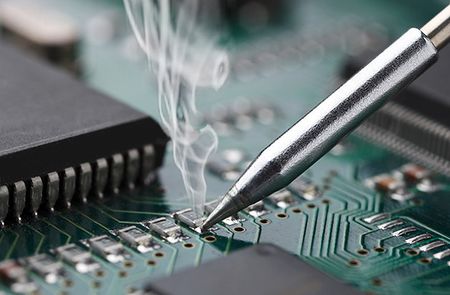Difference between revisions of "Soldering Irons"
| Line 1: | Line 1: | ||
[[File:soldering.jpg|thumb|upright=1.5|Soldering a component]] | [[File:soldering.jpg|thumb|upright=1.5|Soldering a component]] | ||
| + | |||
[[File:soldering_icon.png|100px|left|top|Soldering Iron Icon]] | [[File:soldering_icon.png|100px|left|top|Soldering Iron Icon]] | ||
'''Soldering''', is a process in which two or more items (usually metal) are joined together by melting and putting a filler metal (solder) into the joint, the filler metal having a lower melting point than the adjoining metal. Soldering differs from [[welding]] in that soldering does not involve melting the work pieces. In [[brazing]], the filler metal melts at a higher temperature, but the work piece metal does not melt. In the past, nearly all solders contained lead, but environmental and health concerns have increasingly dictated use of lead-free solder for electronics and plumbing purposes. | '''Soldering''', is a process in which two or more items (usually metal) are joined together by melting and putting a filler metal (solder) into the joint, the filler metal having a lower melting point than the adjoining metal. Soldering differs from [[welding]] in that soldering does not involve melting the work pieces. In [[brazing]], the filler metal melts at a higher temperature, but the work piece metal does not melt. In the past, nearly all solders contained lead, but environmental and health concerns have increasingly dictated use of lead-free solder for electronics and plumbing purposes. | ||
Revision as of 22:16, 18 February 2018
Soldering, is a process in which two or more items (usually metal) are joined together by melting and putting a filler metal (solder) into the joint, the filler metal having a lower melting point than the adjoining metal. Soldering differs from welding in that soldering does not involve melting the work pieces. In brazing, the filler metal melts at a higher temperature, but the work piece metal does not melt. In the past, nearly all solders contained lead, but environmental and health concerns have increasingly dictated use of lead-free solder for electronics and plumbing purposes.
Maker Hub Soldering Irons
The Weller irons use a resistive tip to generate heat. By varying the power through the tip, the temperature can be controlled. The Metcal uses an inductive tip that is tuned to be at one temperature. Important Note: One should never use the abrasive tip tinner on the Metcal tips. This can damage them.
Solders
There are different types of solder available in the Maker Hub. The standard solder is blah. Something in here about the solder pastes as well. Then an explanation of how we need to do something different for the Voltera interactions.
Documentation
pdf comic book of operations
Troubleshooting
Training
Videos:
- Basic Soldering Lesson 1 - "Solder & Flux" (20:44) https://www.youtube.com/watch?v=vIT4ra6Mo0s&index=1&list=PL926EC0F1F93C1837&t=1s
- Basic Soldering Lesson 2 - "Soldering To PCB Terminals" (6:50) https://www.youtube.com/watch?v=Mrhg5A1a1mU&index=2&list=PL926EC0F1F93C1837&t=0s
- Basic Soldering Lesson 3 - "Cup Terminals" (4:19) https://www.youtube.com/watch?v=_GLeCt_u3U8&index=3&list=PL926EC0F1F93C1837&t=0s
- Basic Soldering Lesson 4 - "Bifurcated Terminals" (2:45) https://www.youtube.com/watch?v=hvTiql-ED4A&index=4&list=PL926EC0F1F93C1837
- Basic Soldering Lesson 5 - "Hook and Pierced Terminals" (1:19) https://www.youtube.com/watch?v=sN3V8hMiUb4&index=5&list=PL926EC0F1F93C1837&t=0s
- Basic Soldering Lesson 6 - "Component Soldering" (4:33) https://www.youtube.com/watch?v=AY5M-lGxvzo&index=6&list=PL926EC0F1F93C1837&t=0s
- Basic Soldering Lesson 7 - "Integrated Circuits: The DIP-Type Package" (2:36) https://www.youtube.com/watch?v=VgcPxdnjwt4&index=7&list=PL926EC0F1F93C1837&t=0s
- Basic Soldering Lesson 8 - "Integrated Circuits" (1:16) https://www.youtube.com/watch?v=sTv3gK9tAKA&index=8&list=PL926EC0F1F93C1837&t=0s
- Basic Soldering Lesson 9 - "Integrated Circuits: The Flatpack & Other Planar-mounted Components" (6:20) https://www.youtube.com/watch?v=Nq5ngauITsw&index=9&list=PL926EC0F1F93C1837&t=0s
